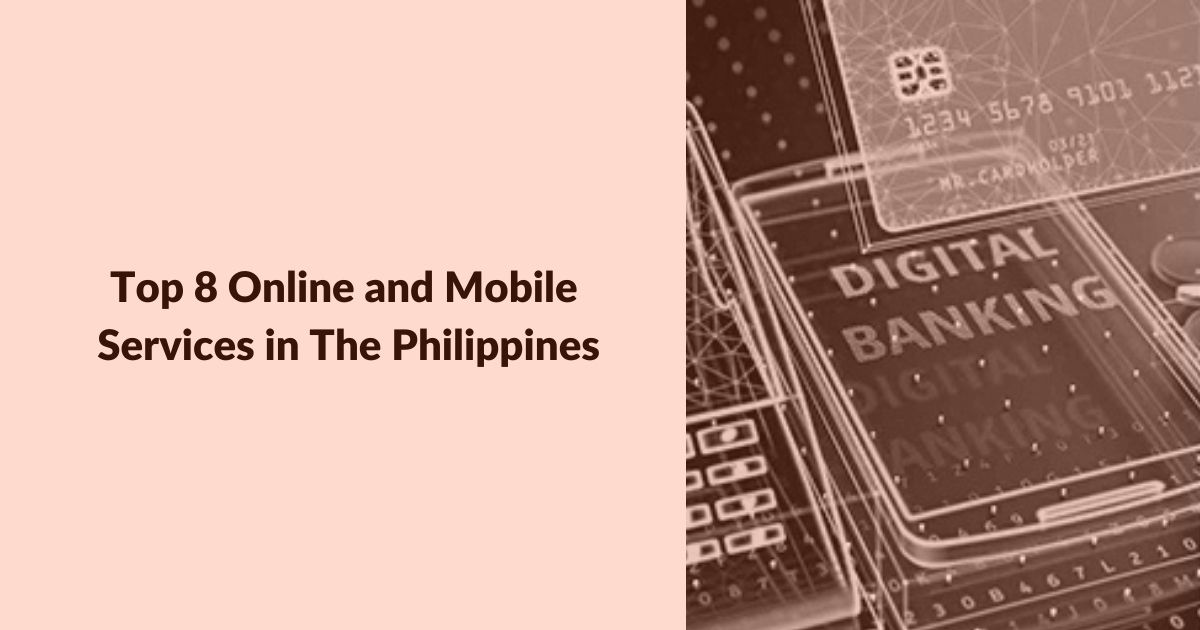
Top 8 Online and Mobile Services in The Philippines

Technology is reshaping and revolutionizing every sector and industry. No wonder the banking sector isn’t an exception.
Nowadays, more than ever before, financial institutions are embracing digital innovations. This enables them to offer more effective and efficient services to customers. And since more people are gaining access to the internet, banks have geared up efforts to win them. Hence, the competition in the sector gets more intense as the days go by.
Table of Contents Top 8 Online and Mobile Services in The Philippines
- Online Banking Explained?
- Other Benefits Customers Enjoy
- Meaning of Mobile Banking?
- Any Difference Between Digital and Internet Banking?
- So, What Differentiates Both?
- Other Things to Note about Digital Banking
- Strengths and Weaknesses of Digital and E-Banking Banking
- Weakness: Problems Customers Face with Both Platforms
- Biggest Banks that provide Internet and Digital Banking Services in Filipino
- Bank of the Philippines Island
- ING Bank, Philippines
- UnionBank Online
- Banco De Oro Electronic Banking and Its App
- Metropolitan Bank and the Mobile Banking Platform
- Commercial International Merchant Bankers (CIMB)
- LANDBANK Mobile Banking Application
- Security Bank Corporation
- Conclusion
According to findings by Rappler, residents of the Philippines are ranked among the most active social media users across the globe. The data show that Filipinos spend more time browsing the internet via their phones than people from other Southeast Asian countries do.
Even with the increased rate at which Filipinos engage the internet, digital and e-banking remain unpopular. A lot of people still haven’t tapped into the opportunities given by digital progress. In fact, the country itself is ranked very low compared to other Asia countries in terms of adopting both systems of banking.
See also: Seaman loan Philippines’ guide
Nevertheless, there’re glimpses of hope – opportunities are constantly springing up for operators to mine. Nestor Espenilla Jr. of BSP shares the same view. He said that individuals, large and small scale businesses are gradually showing a strong drive for the transformation of the banking sector through technology.
The forces driving this digital transformation and growth are the youths who possess vast internet knowledge. A recent finding by the BSP supports this claim. It says that about 89% of the older population in the Philippines don’t even own a savings account at any of the banks. It identifies long queues and the distance of branch locations of these financial institutions are some of the causes.
More so, a survey by the Unisys APAC Banking survey amplified the facts from BSP. 53% of the respondents in the survey claim that long queues in banks made them give up on banking. Good thing, it also revealed that the people are willing to accept transformation that will make banking much easier and stress-free for them.
Both digital and E-banking are born out of this need – to offer much easier, accessible, faster and better banking services to customers.
Online Banking Explained?
Many people hold varying misconceptions about this aspect of banking. A few of them even confuse it with the mobile version of banks. Yet, the number of people who use the system continues to grow each year.
This term is widely used and ranks well among internet users. But sometimes, other terms like E-banking, internet banking, and electronic banking are used instead. In fact, some people use digital banking.
Regardless of how it’s used, online banking means just one thing – banking services that are offered on the internet using platforms like a website. This requires users to create and operate an account with the financial institution on the internet.
Often, each registration process obligates customers to provide digits of their ATM cards. Other times, it’s the debit card details – or account number, or BVNs as it is in some countries.
When you register, you’re able to enjoy services like sending money to people, paying bills, etc. – and everything is done without a need to leave your comfort zone.
See also: The guide about personal loan in the Philippines
Other Benefits Customers Enjoy
The benefits of internet banking are nearly endless. Especially recently, virtually all services of most banks are accessible online. You can even deposit money and prompt withdrawals. Good thing, nearly every establishment has adopted this aspect of banking.
Another benefit of internet banking is that it enables easy and fast access to loans from banks. Regrettably, not many people know this fact. With the traditional system of transactions, you will be required to submit a collateral, guarantor and fulfill some other additional demands. But with online banking, all these bottlenecks are taken out.
There’s just so much to do through this system of banking. It not only gives you total control of your bank transactions. You can also manage, track and report all transactions with your device and from wherever you are.
Meaning of Mobile Banking?
Mobile Banking is an aspect of online banking. So, these systems are similar. However, mobile banking defers in the type of device it operates on.
Internet banking includes every banking activity that’s performed using the internet. The processes require users to use either an app or a mobile version of a website. Mobile banking, however, operates only on application software. So, the user will download and install the application on their phones or whatever gadget they use.
Any Difference Between Digital and Internet Banking?
It’s quite funny how most people use both terms above interchangeably. Their belief is that both terms mean exactly the same.
Interestingly, both systems are growing with the number of subscribers they have. Each year, their subscriber base i.e. people who use them continues to surge across the globe.
Granted, both platforms share similar features. However, they equally share some fundamental differences.
See also: Borrow Money in the Philippines. The Best Ways
So, What Differentiates Both?
E-banking is a mere tech innovation made by commercial banks to make their services more efficient and effective. The aim is to use online features to drive the local platform.
While more clients prefer to visit the web, companies want to track their activities wherever they are. And among Filipinos, most customers prefer to use online services. That is why there are more and more online lending services looking for their costumers. However, E-banking isn’t a standalone service. It’s intended to boost the traditional banking system. So, customers still maintain physical contact with the banks. And the banks largely depend on their physicals branches to operate.
More still, there’re some other services that are exclusively accessible through their physical branch locations. For instance, clients need to visit the local offices to complete their account opening, receive ATM issuance, etc.
In contrast, digital banking has features that are available exclusively on the internet. If costumers need the help of an operator, they can reach one via contact chat tracked into the banking app.
However, mostly, the online banking system operates automatically. It works with technologies, analytics and metrics trackers. Some big players in the digital banking sector like CIMB Bank constantly update their systems.
Mostly, banks that solely rely on the web don’t have physical contact with customers. And every service is rendered on the digital space, especially through chat, email phone app, etc.
Other Things to Note about Digital Banking
In most cases, an opening of the account is related to depositing some money. But that’s not the case with the digital banking system. You don’t pay any fees or have to make a deposit. Digital banking is, therefore, believed to be the future of banking.
That said, the system is still constrained in some ways. While digital banks are standalone, they also rely on the efforts of other banks to function effectively. For instance, their customers have to make deposits at the office of their partner banks. And to make withdrawals, they also need to visit another bank. More so, customers can’t open a joint account with a digital bank.
See also: All about credit score in the Philippines
Strengths and Weaknesses of Digital and E-Banking Banking
No doubt, both systems are developing. Good thing, many people are beginning to use both platforms.
Nevertheless, while digital and E-banking offer powerful innovations and many benefits, they also share some weaknesses. It is important to be aware of these issues in order to make informed decisions.
Strengths: The Benefits of Both Systems
Undoubtedly, both systems offer many gains. Good thing is that the process continues to innovate and include more services that’ll enhance customers’ experience. Here’re other good things about them.
They Are More Convenient and Accessible
They provide costumers with an opportunity to transfer funds even at 1 am. Basically, their activities are available every hour of the day. They only time they go off the air is when they intend to upgrade on their sites or do some maintenance.
Both systems exist for the purpose of making costumers’ life easier. They turn banking into a walk in the park for customers. Conversely, traditional banks operate virtually differently. While they aren’t available every hour of the day, they often require very tedious and exhausting processes.
A whole lot can be done on the internet including paying bills of all sorts. When you set the payment method, your account is charged on every billing circle – whether it’s weekly, monthly or quarterly.
Both Platforms Perform Speedily, Efficiently and Effectively
If you have a good network connection, you can do an online transaction in a few minutes.
Compare that with how long it takes to visit the banking hall for a similar service? Just the stress of queueing up can scare you.
They Enable Customers to Manage Accounts
It isn’t just the fast services that endear both platforms to users. Customers are able to take possession of the entire banking process.
Your account is at the fingertips. At any time, you’ll be able to manage and keep tabs with every transaction using your mobile device anywhere you are. So, your mind is at rest regarding the possibility of scamming.
They Offer Paperless Services
No paper submissions, filling some long forms or any other exhausting manual applications. Everything is electronic. You can make and track your submission by yourself.
More so, both systems enable convenience and storage of documents. So, you can save all the documents and use them when necessary.
See also: How an Unemployed Borrower Can Get the Best Loan?
Weakness: Problems Customers Face with Both Platforms
Just like every other system, digital and online banking suffer their own weaknesses. A few of them are highlighted below.
They Are Prone to Cybersecurity Dangers
This is an obvious fact. You probably have heard of how people’s accounts are hacked online. But then, there’re many other issues that hardly make a headline like wrong payment, identity theft, etc.
Understandably, most Filipinos share this worry – a major reason their acceptance of online and digital banking still drags.
Internet platforms and channels are still susceptible to these security threats. Though experts put in a huge effort, issues like hacking still persist.
They are Hampered by Internet Connection Problems
You know how it feels when you had to load a page for who knows how long – it sucks, right?
Well, that’s one of the major demerits of digital or online banking. Both services aren’t accessible without a stable, speedy internet. And you know how the internet works in most parts of the Philippines.
The on-and-off switching of internet connections in the country discourages even more people from embracing E-banking. Once you are out of coverage you can’t access the services.
Customers Have Hard Time Learning
Another hindrance to both systems of banking is that customers often find it difficult to acquaint themselves with the platforms. Simple tasks like downloading an app for the first time can be daunting to some people.
However, the systems are entirely learnable. It’s only a matter of time. Though some Filipinos can hardly afford that time. They prefer heading to the banks for face-to-face transactions.
Biggest Banks that provide Internet and Digital Banking Services in Filipino
Each year, more companies venture into the internet banking sector. Yet, a few stand out. This review will only give a mention regarding the institutions adjudged the best in the Philippines.
The basis for choosing these eight institutions is clear. They’re offering:
– innovative capacity and helpful qualities
– customer feedback/ratings on their services and devices
– convenient usage of e-channels
– possibility to earn special awards
See also: Personal Loans in Philippines – FAQ
Bank of the Philippines Island
Indeed, this financial establishment leads on many fronts. Not only that it’s the first to launch activities in the Philippines, but it’s also the first in Southeast Asia.
The institution ranks 4th among the biggest financial operators in the Philippines. The ranking is essentially premised on how much assets the banks possess.
2017 was a bad year for the bank. It suffered a networking bug and that’s still fresh in mind. Most of its customers were hit by the problem. But that didn’t deter many from using their mobile banking system. In fact, it remains a force in the industry with huge patronage across the state. They’ve earned the trust over the years.
Of all the platforms for banking activities in the country, the BPI app ranks third by the size of its subscribers base.
It’s striking how the company continues to innovate. Not too so long ago, it remodeled its app to include vital features that will enhance their customers’ experience. For instance, it added QR Code technology.
Its Vital Components:
- It offers services for users to pay bills with ease
- It helps customers to take charge of all transactions by themselves
- It assigns OTP with which users can sign in through different devices
- Its interest rate is between 0.125% and 1.25% (Though the majority of the users are charged 0.25%)
- The least first deposit is between PHP 100 and PHP 250,000. Its other services like Padala Moneyger doesn’t require customers to make firs deposits
- The app enables face ID and fingerprint check to sign in
- Money transfers to other banks on are fast and easy
- Costumers can create a short QR code and use it instead of the account number to receive money
Procedures for Creating Account:
- Go to any of their branches nearest to you with your ID, passport photo and proof of billing
- Obtain, fill and submit their application form
- Make the initial deposit
- Receive your new account in less than 48 hours
- After 7 working days, they’ll issue you an ATM or Debit card
ING Bank, Philippines
No doubt, ING deserves to sit atop the list. As an old and leading establishment in banking, it has driven many innovative projects.
Established 22 years ago, precisely in 1997, this German-owned establishment started in Filipino as just a wholesale lender.
Though vastly experienced in the lending circle, it was until early 2019 that it set up its digitized banking business using its mobile app.
In 2017, the company’s expertise and quality work were celebrated with two separate awards.
Interestingly, its app enjoys good positive customer reviews on Apps stores with a score of 4.3
Major Attributes of the Company Include:
- It operates on a low interest rate of 2.5%. In fact, the rate is about far lower than the average rate in the country.
- You don’t need to keep a minimum deposit or maintaining balance
- It won’t charge any service fees
- It permits users to complete their account registration on the internet and check deposit using the app
- They offer the popular PESONet fund transfer service which helps customers to transfer money to whomever and wherever.
How to Create ING Accounts
- Visit your Play store, download the app and install it.
- Supply the requirements needed to open your account.
- Submit needed documents and that’s it
See also: How To Apply For A Personal Loan: A First-Time Borrower’s Guide
UnionBank Online
If you want to talk about innovative exploits in the banking institution sector, you must take this bank into consideration. UnionBank has helped to transform the banking industry of the Philippines – a major reason it has bagged and continues to win loads of awards. Not too long ago, it claimed the award for the best digital bank, and it wasn’t just one. There’re a few others as well.
EON, a selfie feature, is a part of its widely known inventions that brought powerful solutions to Filipinos. The feature enables customers to use facial recognition to operate their accounts. This has helped secure customers’ accounts and enhanced trust from them.
Not to forget, they have a chatbot that attends to customer complaints, requests, and inquiries in a real-time mode.
It incorporated the digital system into its services in 2017 and since then remains leading in the sector. The Ark as it named operates purely digitally. Now, 85% of its services are accessible via its internet or digital systems.
Vital Components of the System
- It enables users to log in with their fingerprints or face recognition
- It charges 0.10% interest rate
- The platform also generates OTP for paying bills, making transfers, etc.
- There’s prepaid loading
- The first deposit amount is P10,000 for a general savings account and $500/$10,000 for Dollar Accounts. Its Personal Savings Account does not ask for the first deposit
- The least balance to have for maintenance is PHP 10,000 for Regular Savings Account. Meanwhile, it charges $500/$10,000 for Dollar Accounts. There’s no charge on the Personal Savings Accounts
Procedures for Creating a UnionBank Account:
- Visit the bank’s location that is close to you
- Go there with two of your IDs
- Get their application form, fill it carefully and submit
- If asked, pay the first deposit
- That’s it; you can go and pick up your credit or ATM card after 5 working days
See also: How self employed can get a loan. A Step-by-Step Guide
Banco De Oro Electronic Banking and Its App
With its branch littered across the globe, this operator joins a few others to take the first spot on the e-transaction platform. It became the first to reach the P3 trillion threshold in assets acquisition. So, it’s big in the Philippines.
The financial company operates under the SM Group – Philippines’ biggest business amalgamate that’s gained huge successes.
Its app is the second biggest in the user base of the country.
Vital Components of the App
- It has the capacity to temporarily lock and unlock the ATM card, whenever it receives pointers to dangers or tracks suspicious transactions
- The app enables loading of prepaid cellphone
- Its interest rate is between 0% and 1.25% (However, it charges 0.25% on the majority of the accounts)
- Users can manage accounts by tracking the history of all transactions and balance
- The least first deposit is between PHP 100 and PHP 50,000
- It allows quick links to improve ease of use
- The least amount it charges to maintain balance is between PHP 100 and PHP 50,000
- Users can transfer money to other banks
Procedures for Account Opening:
- Visit its branch locations with your ID
- Get and fill the application form
- Sit for a snap through their webcam
- Make the first deposit
- After 7 working days, they’ll invite you to collect your Passbook or ATM – in some cases both of them
Metropolitan Bank and the Mobile Banking Platform
There are quite a few financial establishments that give the best services in the Philippines. However, it appears that some banks are even better as they provide costumers with extra services. A good example is Metrobank.
Its online platform, Metrobankdirect is widely known and used by many people. A mere look at the average rating it receives in the play stores shows the reason for facing the fact that the average user is fully satisfied with their services.
Its Vital Components:
- It has an electronic calculator and an app for people seeking to request for a loan
- It enables users with OTP to send, receive and manage money
- The bank’s interest rate is relatively low – 0.25%
- Users can see the forex rate and other vital information on the platform
- The least initial deposit amount is between PHP 100 and PHP 50,000
- Least amount needed in your balance PHP 100 to PHP 50,000
Steps in Creating a Metrobank Account:
- Got to their site and download their form
- Fill it and take it to any of their branch offices
- When submitting it, keep your ID handy; you’ll need it.
- You’ll get your ATM card in 7 working days
Commercial International Merchant Bankers (CIMB)
Although it started off as a Malaysian-owned loan giver, this financial institution has grown to accommodate virtually all banking activities. In fact, it currently boasts of 1,000+ branch locations across Southeast Asia.
CIMB joined the Philippines industry only recently – precisely January 2019. However, it has taken the spotlight and proven to be a force in the sector. It operates solely digitally and through apps.
With its OCTO app, users can perform all activities virtually via their phones. It takes in all activities from creating personal accounts to sending and receiving money. And to strengthened its hold, it has positioned over 20k ATMs across the country.
Vital Components of OCTOs:
- It offers an all-in-one account management system
- The bank enables the application for an individual loan, sending money, and receiving money
- Doesn’t require service charge,
- It charges an interest rate of between 0.50% and 2.50%
- It doesn’t require any specific minimum balance
- Uses selfie check to verify identity
- Enables prepaid loading
Steps to Take in Opening a CIMB Bank Account
- Download the bank’s app on either android or apple device
- After installation, open it and select the account type you want
- Create an account and generate an OTP
- When you get the number, enter it to finish creating account
- Go on to enter a new login detail for the account and enter other needed details. You’ll find the steps on the site.
See also: How To Get SSS ID Number Online
LANDBANK Mobile Banking Application
Just as it is in many countries, Filipinos hold some skepticism for government-owned establishments. They believe they are mostly inefficient and unserious.
But that seems not to be the case with LandBank, a government-owned bank. Many Filipinos rely on the services of the institution, concerning loans.
But it offers many other commercial services like deposits are topnotch. Its application and internet system contribute even more. So, it’s understandable that it enjoys a 4.2 average rating score on the Play Store.
Interestingly, its app Is number 3 among the most wide-used applications among Filipinos
Vital Components of Its Mobile Banking:
- Its app is connected to an ATM or branch locator
- Customers can see foreign exchange rates on their online platforms
- It charges 0.10% of interest
- In order to protect against a detected security threat, it can lock and unlock the ATM card
- Users can make payments, send money and monitor all transactions
- The least amount customers must leave in the account is from PHP 500 to PHP 20,000
- Customers use biometrics to log in
Steps to Take in Opening the Account:
- Pay a visit to one of its locations. Have your ID, proof of billing, and passport photograph with you
- Get the form, fill it carefully and submit
- Submit other required items
- The customer support attendant will tell you when to collect your ATM card
Security Bank Corporation
This financial establishment has really come a long way. It sprang up moments after the second world war as the first-ever private institution to emerge in the Philippines.
But that’s not all the bank brags on. Its innovative track record is notable. A fit that earned it an award as the Best Digital Bank, 2017 – just one of many others.
Its services, including Online Account Application and Human Switch Kit, are great innovations that aid customers’ experience in opening and managing accounts with Security Bank. Also, it operates an E-savings account through which customers can open and operate savings account on the internet.
Vital Components of the Platform:
- There’re local ATM branches that aid digital services
- Its interest rate is between 0.10% and 1.20%
- It offers UITF subscription
- It enables the use of biometrics to log in
- The initial deposit is between PHP 100 and PHP 10,000 or $500 for a dollar account
- The least balance to leave in the account is PHP500 or PHP 25,000/$500 for a dollar account
- Users can make transfers and payment of bills using the eGiveCash service
How to Open an Account on Its E-Platform:
- Go to the site, supply your personal details on the relevant form
- Receive a reference number
- Visit any of its land-based offices
- Register using the reference code
- Deposit funds and complete your registration
How to Open an account on the Human Switch Kit Platform
- As always, visit the site and fill the relevant form
- You’ll get a message or call from the bank
- Any client will be asked to visit their land-based office
- When attending the interview, go with your ID and passport photo
- After registration, you’ll get your ATM card or passbook right away
How to Get an Account here:
- Go to the site and sign in
- When in, navigate to the eSecure Savings section and choose an open ESS account.
Conclusion
In fact, it is not that hard to find a reliable bank in the Philippines. Moreover, due to the high level of competition, banks are trying hard to make their online services as user-friendly as possible. So, you can pick which online bank to use with certainty regarding what to expect.









